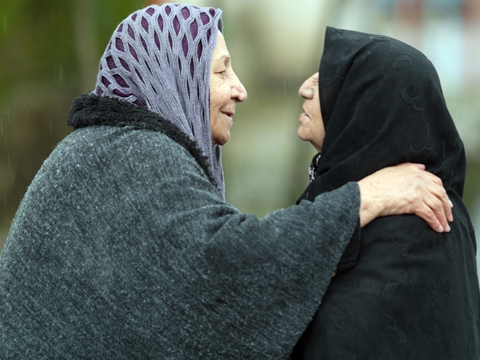
SALVE Alireza Davoodnejad avoids easy resolutions in his critique of class and gender injustice. |
In an episode in Mohammad Rasoulof's weird and wonderful THE WHITE MEADOWS (2009; January 29 at 3 pm) - one of the best entries in this year's Boston Festival of Films from Iran, at the Museum of Fine Arts - an artist is buried up to his neck in salt for painting the sea red. When the authorities demand that he paint the sea blue instead, he refuses. Burying him doesn't change his mind, so they dig him up and waterboard him. Then they force him to climb a ladder erected in the surf and order him to stare at the sun. As a last resort, they pour monkey urine into his eyes. Finally, he's taken away and shackled to the stark white beach of a prison island.
Rasoulof must have had a foreboding of his own fate. Last month, he and Jafar Panahi - the renowned director of The White Balloon, The Circle, Crimson Gold, and Off Side, and also the editor of Rosoulof's film - were found guilty of similar artistic intransigence by an Iranian court. They were sentenced to six years in prison and banned from making movies for 20 years - which in essence means the end of their careers.
The loss to the world of Panahi's potential work is incalculable. And what we lose with Rasoulof's future output can be seen in the searing visionary beauty of Meadows, a dreamlike allegory of Dante-esque intensity and Beckett-like absurdity. Rahmat, an aloof and mournful functionary of some sort, paddles his boat from one barren island to another in a brackish sea gathering the tears of the desperate and mourning individuals who live there. For what purpose? No one seems to know, but they all hope that his task might somehow ease their pain, might restore greenery, hope, and sweet water to their world. A youth seeking his father and the ill-fated artist described above join Rahmat on his journey, and they encounter various surreal horrors, which grow in intensity into something approaching the prophetic and visionary.
Does the tear gatherer stand for holy men who are sops for the powers that be? Is he a stand-in for artists who collaborate with the system? Whatever the case, he's not unlike Ali, the cab driver in Fardin Saheb Zamani's THERE ARE THINGS YOU DON'T KNOW (2009; January 28 at 8 pm + January 29 at 1 pm). Himself a former political idealist who has lost hope and withdrawn from the world, Ali finds himself a grudging confessor for his motley fares, all of whom seem as disillusioned, alienated, and hopeless as himself.
Paralyzed by fear and apathy, everyone is waiting for something to happen to change the stagnant status quo. Perhaps it will be the earthquake some psychic has predicted will level Tehran in 10 days. Meanwhile, Ali has been assigned to pick up a regular customer every evening — a quirky, pretty, funny mystery woman who seems as if she might be his cup of tea. An unlikely combination of Taxi Driver (which is overtly alluded to) and Brief Encounter (which is not), Zamani's debut film stirs with subterranean significance and, rare for an Iranian movie, sexual frisson.